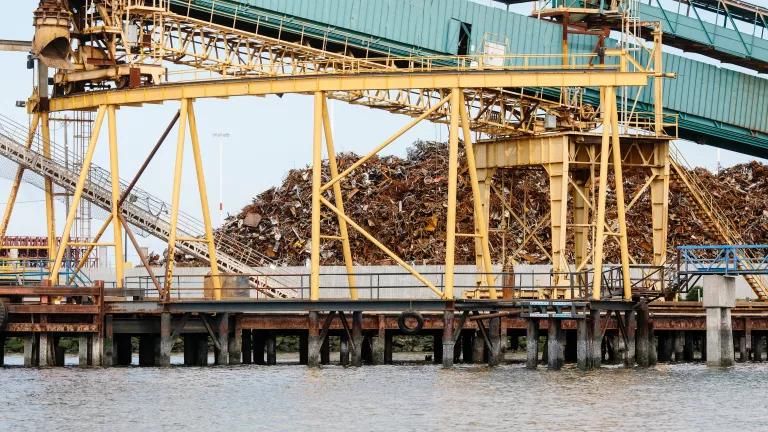Holding DTSC Accountable to Protect Communities

NRDC’s government affairs team and policy experts work to pass laws in California, and we expect them to be implemented as intended for the health of our communities—those that are already bearing too great a cumulative environmental burden. This pandemic has again reinforced that our health cannot wait.
In 2014, the legislature passed and Governor Brown signed SB 1249 by Senator Jerry Hill. NRDC and other environmental and health advocates supported the bill, which directed the state Department of Toxic Substances Control (DTSC) to establish hazardous waste management standards for metal shredding facilities by January 2017. Such facilities are disproportionately located in communities of color and low-income communities that bear the greatest cumulative environmental burdens in the state. Previously, DTSC had issued metal shredding facilities (where consumer goods like appliances and cars are broken down for reuse or disposal), special exemptions under the state’s hazardous waste rules. But as we’ve learned more about the toxic metals and contaminants in the waste from these facilities, it’s clear that it is past time stop these special exemptions and require proper and safe handling of metal shredder waste.
Unfortunately, DTSC has not implemented SB 1249, and that’s why we filed an amicus, or “friend of the court,” brief along with our partners at the Center on Race Poverty and the Environment (CRPE), Communities for a Better Environment (CBE) and San Francisco Baykeeper as part of a lawsuit filed by the Oakland Athletics Investment Group, LLC. In the brief, we ask the court to compel DTSC to either apply hazardous waste laws to metal shredding facilities or adopt new waste management standards for them, as the legislature intended the agency to do when it passed the law.
There are six metal shredding facilities in California and DTSC itself has recognized that the hazardous waste generated by their operations is releasing toxic pollutants into California’s air, water and soil. While this lawsuit focuses only on Schnitzer Steel’s shredder facility in Oakland, we hope that a favorable ruling would lead DTSC to implement SB 1249 and apply it to all metal shredding facilities in California.
NRDC and our partners felt it important to weigh in on this case, not only for the health of the communities around Schnitzer Steel in Oakland, but for other communities near metal shredding facilities and other sources of hazardous waste throughout the state.
Additionally, we continue to work together on broader reform of DTSC so that it has the resources and imperative to do its job to protect people and the environment from hazardous and toxic substances in our air, water, soil and consumer products. That’s why we supported Assembly Member Cristina Garcia’s AB 995 in 2020 and will work with the legislature and the Newsom administration on AB 1 in 2021. As our partner Ingrid Brostrom at CRPE said in our joint press release, “DTSC has a long history of failing communities near toxic facilities. The department's lax regulation of this inherently dangerous industry is yet another example of why we need to hold DTSC accountable to its public health mission."
Passing significant legislation always takes time and can take two to five years or even longer. But in the case of DTSC, which plays such a critical role in safeguarding the health and well-being of already overburdened communities, we are out of time. We will continue to work with the Department, the Newsom administration and the legislature to ensure they have the tools and authority to do the job and hopefully that happens with the ultimate enactment of AB 1 this legislative session. But we’re also prepared to pursue remedies through the courts when DTSC doesn’t exercise its existing authority to reign in polluting metal shredding facilities.
